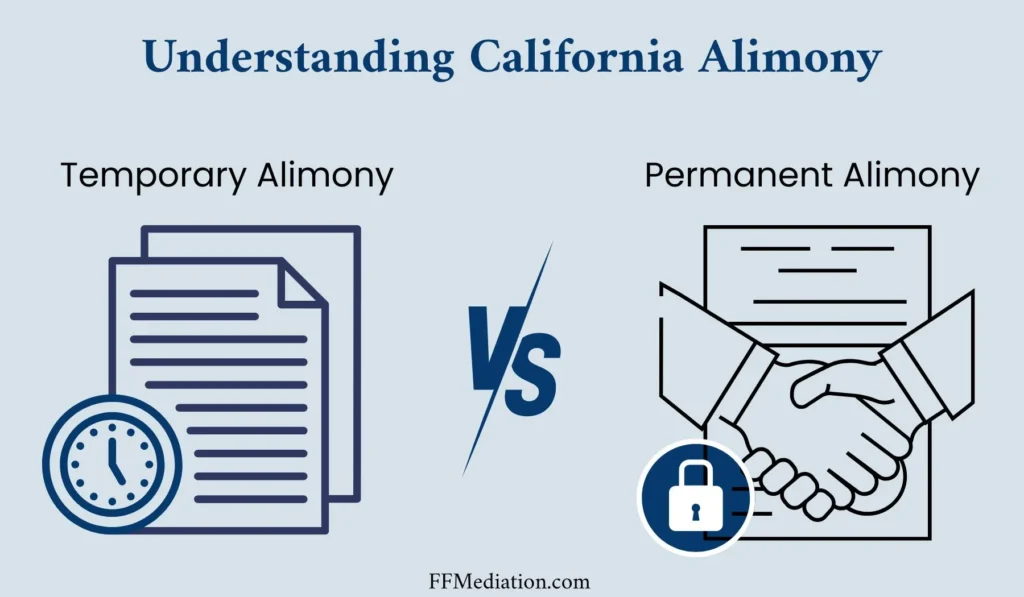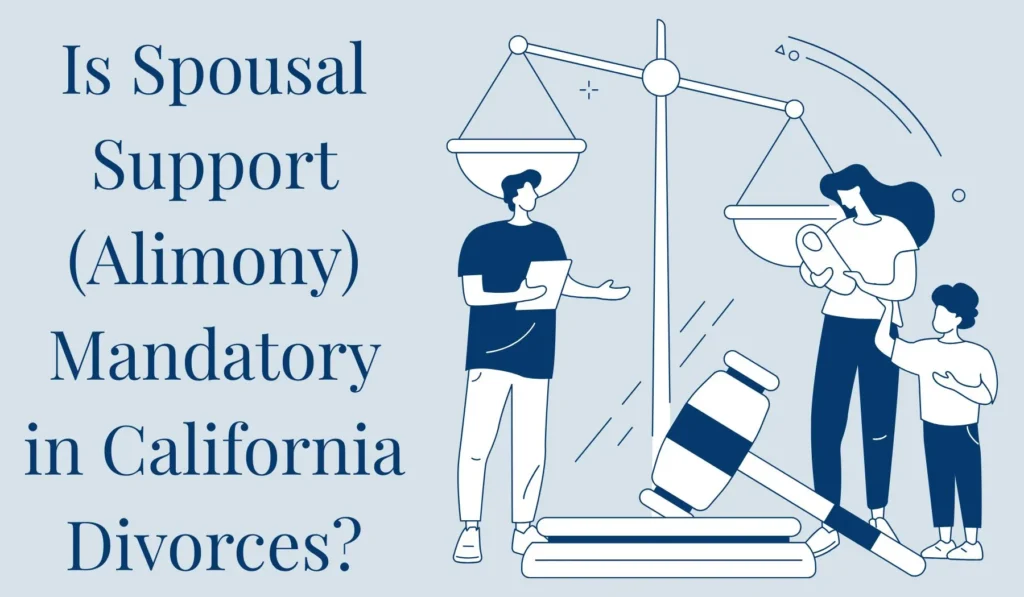Providing Divorce Mediation Services Throughout California
Providing Divorce Mediation Services Throughout California
Home » Divorce and Family law Blog » Can You Avoid Paying Alimony in California? Here’s the Answer

Dina Haddad and her team are here to help you find calm, fair solutions. Call us or book your consult today.
Alimony in California is one of the most complicated conversations in family law and often its most misunderstood entity. Having to pay spousal support during divorce/ legal separation or after divorce can be frustrating. And, not receiving enough spousal support can be very scary too.
My spouse is forcing me to pay support despite his history of domestic abuse. My spouse is self-sufficient. Why should I pay her support? My spouse has a master degree and has the ability to work. Can I avoid alimony?
Marital agreements (both prenup and postnup), domestic violence, financial shifts, and spouses remarriage or cohabitation can become your strong ground in avoiding alimony.
But you have countless options when you navigate alimony. More of these options like spousal support litigation or collaborative practice are highly expensive and time buying. The former is more contentious and involves a lot of emotional drama.
However spousal support mediation with Dina Haddad is amicable and can save you whooping costs unlike litigation. If you want to modify or avoid alimony, book a Free consultation with Dina to explore your options.

Alimony (aka spousal support) is a financial agreement in which the ex-spouse pays financial support to the other spouse after a divorce. Generally, spousal support is paid monthly with additional payments for irregular income like bonuses or overtime. There are two types of alimony:
It’s paid while the parties are divorcing. The courts may use a temporary spousal support calculator – DissoMaster – to determine the amount of support to be paid.
This spousal support is also called long-term spousal support, and a high-income divorced spouse pays this to the recipient once the divorce is finalized. You can modify your existing spousal support order or or get out of paying permanent alimony for legal separation or divorce in California, if you agree with your spouse using alimony divorce mediator or opting (for tough and stressful) spousal support litigation to prove in the court that significant financial shifts have occurred in your life (because of illness, mental health or job loss, etc.) or your spouse is financially independent or remarried to someone.

No, California spousal support is not mandatory but its calculation and determining how long alimony lasts could vary from case to case because it’s a multilayered entity in divorce or legal separation– often misunderstood – and influenced by marital length, marital agreements, abuse, and domestic violence.
The courts in California could look upon multiple factors and laws before awarding alimony. Some of those factors are:
The high-earning spouse pays the alimony to the lower-earning spouse to maintain their standard of living established during marriage until they become self-sufficient. The higher the income disparity, the more spousal support will be needed for a longer period of time, unless the couples agreed otherwise.
The spouses’ marriage length (long-term, mid-term, short-term, etc.) also influences support orders. The general rule is that the spousal support is paid for half the length of the marriage for shorter ones and for longer ones the court will not include a termination date.
Basically, the judge must give the parties time to see if the supporting spouse has been able to become self-supporting. The paying spouse can request the court to terminate at a later time – the general thought is after half the length of the marriage plus one year.
Physical and mental health can factor into the amount of spousal support in California. Suppose one spouse has mental, physical (chronic illness, disability, etc.), or emotional health issues, and his/her deficiency limits his/her ability to work or be self-sufficient. In that case, the other spouse is likely to pay the alimony to the spouse facing severe emotional or physical health conditions limiting his ability to be self-sufficient.

This section explores four different scenarios that spouses navigate while avoiding alimony in California.
California prenuptial agreement can do a lot of things to address alimony matters. If partners agree on waiving off alimony then, they can have those provisions in the prenup to waive the right to request alimony.
Married couples can use it to set specific conditions that can limit alimony to a specific number of years or they can set the predetermined monthly amount in alimony. A prenup can include conditional clauses which can limit or waive off alimony in case of infidelity.
The California Family Code § 1612 c addresses the premarital agreement handling spousal support. According to it, the premarital agreement would not be enforceable if the spouse who’s asked to give up spousal support is not represented by the independent counsel (at the time of enforcement) or if it was unfair at the time of enforcement.
Spouses can use postnuptial agreement to limit or waive off spousal support. Postnups are used not only to avoid it ( if you feel that you’re on the hook for support) but also if you want to ensure it’s a part of divorce.
Postnups can be used to limit alimony in case of certain conditions like if no children are born from the marriage. Spouses can also use it to set a pre-defined amount of financial support if divorce happens. For example, adding the lump-sum clause in the agreement can allow the supported spouses to pay the spouse only a lump sum financial support in the event of divorce.
However, the success of your postnuptial agreement in avoiding or limiting alimony would depend upon; which option you choose, how skilled professional postnup (mediator) or lawyer you hire, and how much you prepare.
California courts scrutinize postnup very carefully and the court or judge can throw it out once they find it unfair, involuntary, lacking transparency (in declaring incomes, assets, or debts) or unfulfilling legal formalities.
Related: Prenup Vs. Postnup in California
Yes the length of marriage in divorce affects spousal support. But how long you must be married to get alimony in California is a bit difficult to answer because it also depends on various factors and court and as the court review other options as per California Family code §4320 – including but not limited to :
But it’s also important to note that for shorter marriages (of less than 10 years), alimony is temporary and is likely paid for half the duration of marriages and for longer marriages (of more than 10 years) it may go for a longer period of time or longer than one-half the marital length.
Yes, domestic violence can impact temporary and permanent spousal support awards. Domestic violence – which can be physical, mental, emotional, physiological or sexual abuse in the context of California law – could impact duration and length of alimony.
Domestic violence creates presumption against awarding alimony to an abusive spouse and the courts may restrict the award to the abusive spouse (if they’re convicted for DV).
Similarly, the judge could consider the impact of abuse on the victim spouse to decide the alimony amount and duration. For example, how DV affected the victim’s overall situation, their earning capacity, emotional and mental health , personal safety and ability to work.
Spousal support is meant to help a financially dependent spouse transition to independence. The judge may consider your spouse’s education, work experience, and current employment like factors in deciding alimony payments. Evidence such as pay stubs, job offers, or vocational assessments can support your case. According to California Family Code §4320, the court gives significant weight to the earning capacity of both parties when determining support.
If you’re worried about paying too much alimony payments because your spouse is intentionally undermining their income or ability to work, then obtaining a vocational evaluation can help you with fair reduction or termination on alimony payments.
Because the purpose of alimony in California is to leave no spouse destitute or when they are unable to support themselves after divorce. The vocational evaluation can help you if your spouse is qualified and/or has a master degree and intentionally remains-at-home.
You can request a jude to modify existing agreements or use settlement mediation – of course the better and cheaper option in California – for reducing/ terminating alimony payments if there has been a significant change in your or your spouse’s circumstances.
For example, if there’s a decrease in your income, or you lost your job and/or facing illness, you can use any of the routes (mentioned above) to reach a quality and mutually beneficial agreement on modification.
According to California Family Code 4337 alimony automatically terminates when the recipient spouse remarries unless the divorce agreement specifically states otherwise. Likewise, if the recipient spouse is cohabitating, the court presumes that the supported spouse’s financial need has decreased, leading to modifying or limiting spousal support based on the reduced financial needs.
California divorce mediation has countless benefits for all family law matters including spousal support, child custody and child support matters. According to the studies published in the American Psychological Association; mediation settles a large percentage of cases otherwise litigated, it augments settlement process, saves money, and increases compliance with agreements. The research also reinforces that it fosters party satisfaction.
Compared to spousal support mediation, if we review other routes like collaborative divorce or litigation, we see that they’re expensive (both in terms of time and cost), adversarial and/or require a trial.
Mediation with expert spousal mediators like Dina Haddad can help you reach a fair agreement without a contested trial and decide for you. You can have your own attorneys – too – in mediation but it’s legally optional. Lawyers can help you understand legal entities and review settlement agreements. But if you’ve to negotiate in mediation on alimony payments, you must have a realistic plan that reflects that supporting spouse does not require alimony either because of their standard of living or other legally valid reasons.
Alimony awards in California vary from case to case. However, it’s roughly calculated this way:
Example: One spouse makes $10,000 while the other earns $4,000. By subtracting $2400 (60%) from high earner’s $4,000 (40%), the spousal support will be $1600.
Qualifying for spousal support in California may depend upon spouses’ marital standard of living during the marriage, marital length, age of each spouse, (financial) needs and health, spouse’s earning potential and child-care duties, etc.
It does matter what a working or non-working spouse is entitled to in a divorce because California is a community property state, meaning that properties, assets, and debts acquired during your marriage would be divided equally or 50/50 between you two.
Yes, you can get a divorce in California without paying spousal support if you meet the following requirements:
Various factors in California, including but not limited to, could influence spousal support payments in California. These are:
For marriages less than 10 years, alimony could be temporary and would be likely half the length of marriage (including but not limited to spouses standard of living, earning capacity, etc.). And for longer marriage alimony is permanent and more than one half of the marriage.